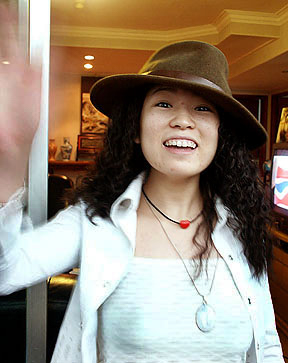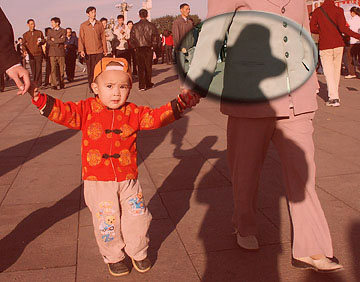Sometimes even if you try to learn a language, you’ll get caught off guard by the words you hear and the way they’re used. For example, the most frequently heard words I hear in China are not “Hello” or “Goodbye” as one might expect. No; the most commonly heard words, often spoken very loudly and forcefully like an angry Japanese businessman, are “Negga” (which means “Ummm….”; it also can mean “that”), and”Jegga” (which means “this”.) Yes, that’s right, the word for “Ummm” is a two-syllable word! And it is often repeated sequentially, negga negga, just like Americans…umm… ahh… speak. These two words dwarf the frequency of “Hello” and “Thank You” by an order of magnitude (see graph), followed closely by the very loud and explicit sound of expectorating.
(Technical note: Although it will probably mean nothing to you, I am obligated to point out that the correct Romanization of the Chinese words are spelled “Zhei ge” and “Nei ge”. Yes, that’s right; the official transliterations throw out the established sounds of our alphabet and replace them with brand new sounds you need to learn. Who decided that was a good idea??)
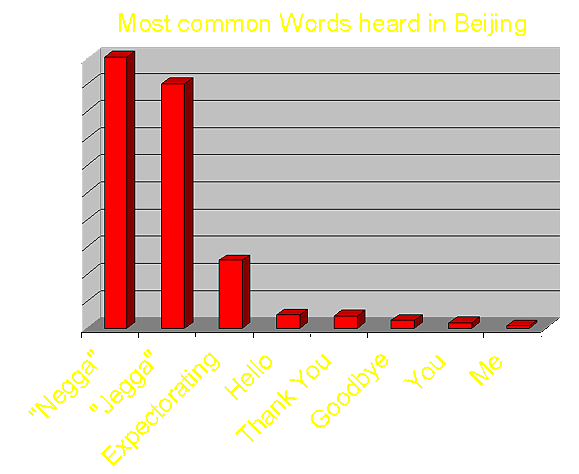
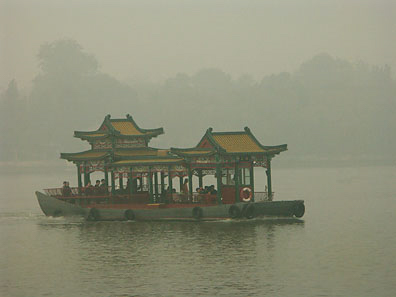
This is China, remember? (I could draw an analogy to how I’m navigating my way through the business culture in a fog, but there is no place for such self-depreciating humor in my life (even if it is true!)).
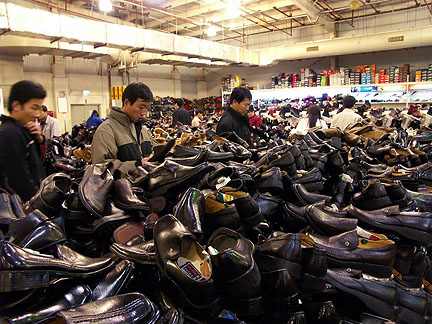
A good place to sample some sole food.
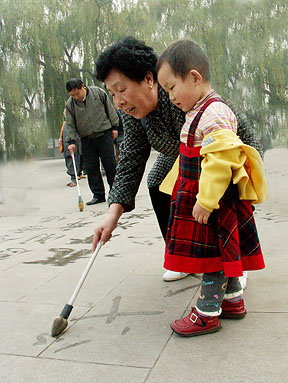
A grandmother teaches writing to her granddaughter. Writing with water (which quickly evaporates) helps to remind us that all things on this earth are transitory.
Doing Business in China
In addition to teaching, writing this weblog, taking pictures, and tutoring on the side, I am also still involved in the two other side-ventures mentioned in Chapter 5, one of which is exploring the idea of starting a business to recruit native speakers to teach English throughout China. The business plan continues to evolve, and I have already started working on a web site as an online brochure to attract English teachers (www.OneYearAdventure.com).
For awhile, the more we investigated what it takes to start a business here, the worse it looked. The barriers are high. The need to “know people” is paramount. A white person cannot head a company, and finding an experienced AND trustworthy businessman here can be a challenge. After working over the financial spreadsheets for almost six weeks, I was ready to throw in the towel — for the amount of effort and risk involved, the reward just wasn’t compelling enough. But that was Sunday morning.
It is difficult to explain how the business climate is different because so much is changing. Each business is very heavily regulated and audited monthly to try to prevent rampant cheating. The practice of ‘cooking the books’ is so bad here that last year the government mandated that every business generate invoices through their proprietary system which uses encrypted barcodes (makes forging invoices difficult) and each one must be individually registered with the tax board!
Every company MUST have a local, registered Chinese resident at its head, and you must have 100,000 RMB (about USD $12,500) in the bank to show you are serious. Every business must have it’s mission scrutinized for 3 months by a company registrar before a license to practice that business can be granted.
But what if you’re a foreigner wanting to set up shop here in China? Then the process gets more difficult. You need to post $1 Million U.S. Dollars in the bank (which you can tap as working capital), and again you must have a local Chinese resident at the head. The only way around that is to set up a “foreign office” of a parent company, which again requires $1M in the bank and you are forbidden from doing any financial transactions – you are there strictly for marketing purposes.
Let’s see… what else?
-
In China, you just can’t sign for anything, as your signature carries no legal weight. No, you need an official registered corporate stamp to validate all documents. (A stamp which can be easily stolen, by the way!)
-
Because all the local business districts feed off of your profits, they make it very, very difficult to move from one district to another, or to register in one district and conduct business in another.
-
For every employee you have, it costs you more than that employee’s monthly salary to pay monthly premiums for not one, but FIVE different types of insurance: Welfare, Medical, Unemployment, Pension, and Housing (the latter being a new one). Hiring a retired person carries no such responsibilities, however, and there’s a lot of experienced Chinese people who are victims of forced retirement to choose from. A loophole!
-
Collecting your receivables is also a hard problem, but despite all I’ve heard I’m not sure it’s harder than anywhere else.
I’m sure an experienced businessman here can tell a lot of horror stories about what it’s like. (In fact, and experienced businessman has agreed to contribute such stories to this web page, and they will be added here when they are received.) But the one message I’ve been hearing consistently from everyone I’ve spoken to is that things are changing – the Chinese government is aware of the problems and the corruption, and the WTO has lit a fire under them to clean up their act fast. Corruption is now an executable offence, and there have been a few in Shanghai who have served as examples. Corporate scrutiny and barriers to entry are only going to get higher, which means if you can survive the process of getting licensed, there will be less competition. In all, I believe in about 10 years the business climate will finally become amenable to and safe for Westerners.
So what happened on Sunday?
By Sunday afternoon, everything changed. I made it over to Dr. Loren’s new palatial apartment building (which cost him less than $500 US Dollars per month!!), with both spreadsheet and list of un-addressed risks in hand, ready to say, “Well, after exploring the opportunity thoroughly, I’ve decided that this will not be a fruitful venture for me.” And I would have been right, except that just before I was going to make this proclamation, Tory, Dr. Loren’s son, had a brilliant idea – just a minor change to the business plan would bring in a lot more profit for a lot less work!
We ran through the numbers on the spreadsheet, and I couldn’t believe my eyes. This is far better than I was expecting! Legally it was much easier to implement; the paperwork to process teachers became more streamlined, marketing would be easier and less costly, the issue of collections would all but go away, and revenue and profits were all there!!! I could not find any holes in the strategy. We could even triple the budget for bribes and still come out ahead! Tory is a genius.
Of course, a million things could derail this, not the least of which is the fact that none of us know the business environment here. But Dr. Loren seems undeterred at the prospect of bureaucratic hell in the process of setting things up, and, well, I’ll be back home, so it won’t be my problem. So I ponied up (perhaps I should say “Dragoned up” since I’m in China) my share of the investment money — the equivalent of two month’s salary. (It’s all Monopoly money to me anyway, and besides, the Chinese government says that 30% of my earnings must stay in the local economy). Then I was given marching orders to begin the recruitment process NOW; for we’ll need 20 teachers by mid-February to get the program started. (That’s no problem; I’ll just do that in my spare time! 🙂 )
As always, I refuse to get excited about any opportunity until the money’s in the bank. We’ll just have to wait and see how this all plays out. Trust me to keep you well-informed about the latest news.
The Beijing Fool – Investment Opportunities in China
For all of my rich friends with an investment fund, here are some other golden investment opportunities that I see for the future:
1) The Chinese Government this year set a goal of having 3 million of its citizens be fluent in English by 2008 (the year China hosts the Olympics). The demand by all schools – elementary through college – for native English teachers is quite strong and the supply chain right now is haphazard. An opportunity! FUND ME!! 🙂
2) The Yuan (or R.M.B., China’s currency) is currently “closed” and will be brought into tradeable condition in a few years as part of the roadmap conditions for being a member of the World Trade Organization. Once the currency becomes “open” and traded it is expected to increase in value by about 60%.
3) Although it is dirt cheap to live here now, because of the insane amount of economic growth I can already see real estate prices in the heart of the city start to increase. In 10 years I believe all prices will start to rise and be brought in line with the rest of the world as China continues to open up. I further believe that investing in an apartment complex or other real estate will be an outstanding move for the patient investor.
4) Although I will discuss driving habits of Beijingers in another chapter, I will tell you that with the way people drive here, the brake pad replacement rate must be 380% higher than in the states. Therefore investing in the company that makes brake pads for the busses and taxis here has got to be a shrewd move.
5) Halfway up Mt. Taishan I came to the realization that the patent that had blocked my attempt to commercialize the Data Egg in the States has no jurisdiction in China, where the market must be at least 10,000 times greater! Yes, a new typing scheme would have to be devised, but it can’t possibly be any more complex than the one currently used to type Chinese on a cell phone’s numeric keypad!

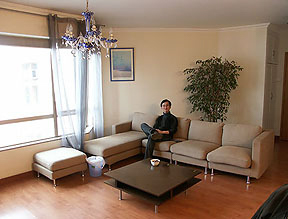
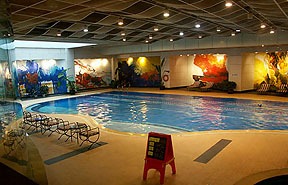
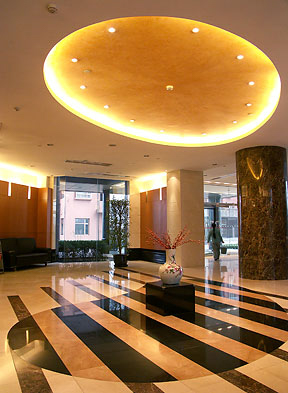
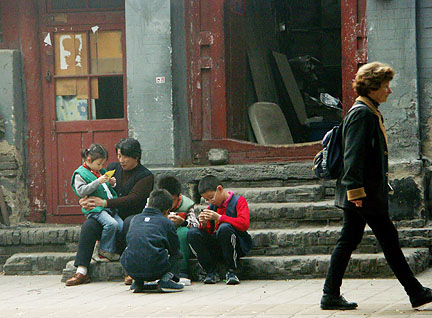

Meet the Students
What’s it Like to Live in China (Beijing)
By Zhang Wei (“Linda”) 00151H
I was born in Beijing, the capital of China. It has very long history, and it’s the emperor’s home. As I grew up, I saw Beijing is changing all the way. There are many buildings in the city, but what I like is courtyard.
A courtyard consists of several houses, all connected together, so there are several families living together in same courtyard. People usually get along well, and think it’s a big family in one courtyard. When you want to go out to buy something, you don’t even need to lock the door, you neighbors would be there look after your house. Some old people or retired people would love to take care of children in their courtyard, so their parents don’t need to worry about them. I think there’s another thing also very good, especially nowadays most families have only one child, children become selfish and don’t know how to take care of others, but to live courtyard environment and live with many other children, they will learn how to care other people how to think for other people, and how to cooperate with other people. I think this is very good for their character development and also good for their future life.
What is the most important thing for Chinese? The answer is absolutely the Spring Festival. It’s same as Christmas in America. Almost a couple of weeks before the spring festival, we will prepare to get back to our hometown, because at that period, all the Chinese people want to be with their family. When I was young, I saw my grandparents would start preparing almost one month before the Spring Festival. They would make a lot of delicious food, luscious drinks, and countless kinds of snacks. The Spring Festival period lasts for almost 2 weeks, and the entire month would be full of happy atmosphere. We get together and spend happy time with family. It’s the beginning of a year, we wish each other for a prosperous year. I’m really happy with Spring Festival. And another thing is children usually get New Year money gift from older generation. Since the period is long, we also go to visit our relatives and friends. Everyone is happy, everywhere is joyful.
I love to live in China. I love to live in Beijing!
Ode to a Hat
Oh, Hat!
You were my faithful companion.
You protected me when it rained;
you shielded my scalp from the closest star,
you were my pillow during my endless travels;
you brought unexpected joy when selecting students;
and you withstood endless indignation when my students didn’t want to get selected.
Silently and without complaint you dutifully did what you were asked
whether being an impromptu shopping basket or a frisbee during class breaks.
Always springing back into shape no matter how severe the contortion.
You were always there for me when I needed you.
Always eager to please, always happy to oblige, never asking for anything in return.
You were my loyal sidekick. You were the icon of adventure. You were the pride of Pendleton.
But, oh Hat!
We are no longer a duo.
I carelessly left you in Wangjing
On a park bench, near midnight.
You sat silently as I put you down to take time exposures with my camera.
You said nothing when I started to walk away.
You did not yell out when I started to abandon you.
You did not show anger or remorse at my neglect.
For all the years of faithful service and loyal companionship you gave, I had taken you for granted.
I had not shown my appreciation.
And yet, you may be sitting there still, silently in the freezing twilight, patiently awaiting my return.
I pray that another will find you and taken you in.
One who will not leave you due to careless neglect.
One for whom you can serve diligently once again.
One who will honor you as you deserve to be honored.
One who will reciprocate your loyalty and faithfulness.
One who will be more responsible.
Oh Hat, I shall never forget you!
Please forgive me for the way I treated you,
the way I had thoughtlessly abandoned you,
the way I left you to die.
And forgive me for the brevity of my mourning;
for I have already found another.
One with an equal amount of character.
One which will keep my ears warm during the impending winter.
One which also matches the Chinese / Russian army overcoat I bought
because it gets $#$%^ and * cold here in Beijing!
Until next time…
“Yours Truly, Gary Friedman”
December 2, 2003

